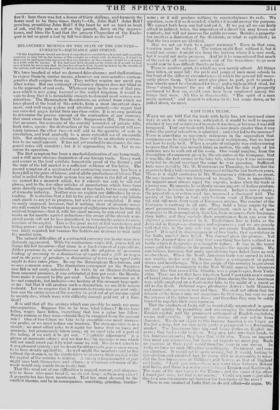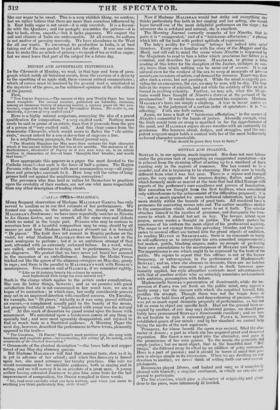EAST INDIA TRADE,
WHEN we are told that the trade with India has not increased since 1814 in such a ratio as was anticipated, it would be well to inquire whether it has not so increased because it was free, or because it was still hampered. That our trade with India is now much greater than it was before the partial relaxation, is admitted ; and what led to the increase? There is something so supremely ridiculous in the supposition that commerce can be injured by the removal of restrictions, that we know not how to reply to it. When a sceptic of antiquity was endeavouring to prove that there was no such thing as motion, the only reply of his audience was to walk out of the room. One would imagine, from the description of commerce given by the advocates of the Company, that it was like the fast runner in the fairy tale, whose legs it was necessary to littlest he should overshoot the game he was pursuing. Sufficient facts wcie std ed lw Mr. 'W. Wierreneas: on Thursday, to show that the exports to India !tad enormously increased within the last fourteen years. There is a slight confusion in Mr. WHITMORE'S statement, we grant. He says imports have not increased so largely. This is impossible; the imports must always equal the exports, unless when the trade is a losing one. By imports, he evidently means imports of Indian produce. Even these, however, have greatly increased. Indigo is now a staple; the importation of cotton wool has inereased a thousand fold. The quality of the latter is bad: why?—from want of European capi- tal, and still more from want of European science. The conduct of the Company is contrary to all rule. They hold a large empire by the most precarious tenure—by the attechment, such as it is, of men strangers to their complexion. tlwir kin, their manners, their language, their faith ; and they exclude their countiymen from any even the slightest permanent interest in it. Englishmen live in India as the Jews did in Egypt—as strangers and sojourners ; and Nye are gravely told that this is the only safe way to pereet uate English dominion there! It i said in discouragement of five trade, that. speculators in the India market have failed. The .Tournal gives the process. Yet even the Journal does not deny that something has been realized in a traffic which it de:len:Iles as a coopplete failure. It has in.the worst cases paid ten shillings in the pound, besides the ageets' profits. We can believe, however, that many speculations have failed there as well as elsewhere. When the South American track was opened in 1813, One worthy trader sent to Buenos Ayres a consignment of patent stoves and hearth-rugs. When the people of this country began about. the same period to emigrate to the New World, among the laboureri seeking hire that crossed the Atlantic, was a gamekeeper, from York- shire. There arc few that have forgotten Lord !ASTLEREAGR'S cargo of barrel staves for the use of our naval force during the last American war, while employed on a fresh-water lake in the midst of a forest as old as the flood. Detireed regev plectuntnr Aehiri : both Ministers and merchants go wroug now and then. We shall not affirm that the interest of the fornmr max not sometimes lie that way, but. sure we are the interest of the latter never does ; and therefore they may be safely trusted to regulate their own business.
That the products of India will be wonderfully augmented in quan- tity and quality by permitting and encouraging the introduction of English capital, and the permanent settlement of English capitalists, seems indisputable. At present we receive all our cotton from America. We do not object to this because America is no longer an English colony, but \VC may fair iv prefer a permanent to a fluctuating market. Tic Americans ilaVc i1111,0ed lteave d:dies on English im- ports; they hail a right to do so. Thee may take into their heads, to lax Americao exports ; they have that riellt also. Taxes on imports"- they must pay themselves. hut taxes on experts we must pay. Such an exert tee of their right would therefore issue in our wrong. In Julia we have no such difficulties io anticipate. Its interest and ours are identical. It would not he quite so easy, but it would, looking to this obvious and admitted fact, be every whit as reasonable, to inter- dict the free intercourse of Middlesex and Serosy, as that. of England and India. " Look yon now,—there is a V, ater runts between Britain and Inch, and thieve is a water nuts but \ viun London and Soul hwark. The name of the one water is flue Thames, and the mune of the other I forget just. now, but flint is no mailer.- Could any man ohject after this to a non-intercourse act between the two banks of the river?
There is one product of India that we do not affect—its sugar. IV( like our sugar to be sweet. This is a very childish liking, we confess; but we rather believe that there are more than ourselves influenced by it. East India sugar is not sweet—it is only sweetish. It is a favour- ite with the Quakers ; and the protege resembles thepatrons—it is fair to look, clean, smooth,—but it lacks piquancy. We suspect the soil and climate of India are unfavourable. At all events, its culture is not matter of pressing necessity. We have abundance in the "West for all our wants. To encourage its production in India, is at best taking out of the one pocket to put into the other. It was our inten- tion to make this an article of grocery—to speak of tea as well as sugar; but we must leave that part of the subject for a future day.



















 Previous page
Previous page